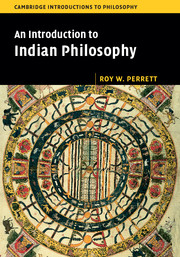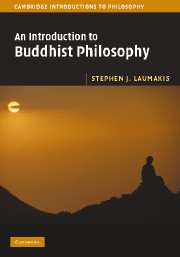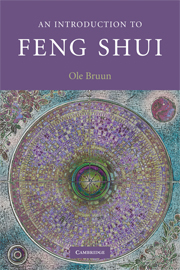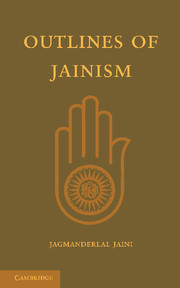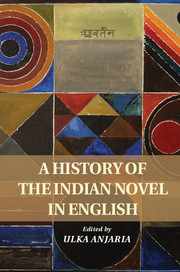An Introduction to Indian Philosophy
Part of Cambridge Introductions to Philosophy
- Author: Roy W. Perrett, University of Melbourne
- Date Published: February 2016
- availability: Available
- format: Hardback
- isbn: 9780521853569
Hardback
Other available formats:
eBook
Looking for an inspection copy?
This title is not currently available for inspection. However, if you are interested in the title for your course we can consider offering an inspection copy. To register your interest please contact [email protected] providing details of the course you are teaching.
-
This wide-ranging introduction to classical Indian philosophy is philosophically rigorous without being too technical for beginners. Through detailed explorations of the full range of Indian philosophical concerns, including some metaphilosophical issues, it provides readers with non-Western perspectives on central areas of philosophy, including epistemology, logic, metaphysics, ethics, philosophy of language, and philosophy of religion. Chapters are structured thematically, with each including suggestions for further reading. This provides readers with an informed overview whilst enabling them to focus on particular topics if needed. Translated Sanskrit texts are accompanied by authorial explanations and contextualisations, giving the reader an understanding of the argumentative context and philosophical style of Indian texts. A detailed glossary and a guide to Sanskrit pronunciation equip readers with the tools needed for reading and understanding Sanskrit terms and names. The book will be an essential resource for both beginners and advanced students of philosophy and Asian studies.
Read more- Includes detailed explorations of the full range of Indian philosophical concerns, including epistemology, logic, philosophy of language and metaphysics, providing students with an informed view of the broad range of classical Indian contributions to philosophy
- Analytical, philosophically rigorous and introduces some metaphilosophical issues without being too technical for beginners
- The chapters are thematically structured providing readers with a summary of not just the different schools of doctrines but also the details of Indian philosophical arguments and their theoretical and philosophical motivations
Awards
- Winner, 2016 Choice Outstanding Academic Title
Reviews & endorsements
'This is one of the best introductory books on Indian philosophy that I have read. It is even-handed in addressing the pros and cons of each problem, it is sophisticated and up to date, and it places issues of Indian philosophy in the context of the current Western philosophical tradition. It will be suitable for undergraduate philosophy majors and minors, and also for graduate students taking a first course on Indian philosophy.' Prasanta S. Bandyopadhyay, Montana State University
See more reviews'This is a remarkably clear and systematic introduction to the history of Indian philosophy. Perrett wisely abandons the 'six systems' approach for a topical approach that makes much more sense of the Indian philosophical landscape. This book will be an ideal textbook for an Indian philosophy course, and will be immediately accessible to philosophers to whom this tradition is unfamiliar.' Jay L. Garfield, Yale-NUS College, Singapore
Customer reviews
17th Oct 2024 by UName-401233
Swami Narasimhananda, Reading Religion Indian philosophy has been often denied the official designation of “philosophy,” and many academics around the world have dismissed it as vague theology, at best. The main reason for such a relegation has been the inaccessibility of the languages in which the source texts were written. This problem was aggravated by the lack of readable English translations. Though, beginning in the nineteenth century many books on Indian philosophy have been written in English, most of them are inaccessible to scholars outside the tradition, both in language and approach. If Indian philosophy is to be taken seriously, and if academics and lay alike have to benefit from the treasures hidden therein, it is necessary that the original concepts and theories are made more accessible and understandable—even to the beginner. An Introduction to Indian Philosophy is a welcome step in this direction. The uniqueness of An Introduction to Indian Philosophy becomes clear even when one skims through the table of contents. Unlike traditional approaches previously seen in Indian philosophy textbooks dealing with every school of philosophy separately, author Roy W. Perrett selects seven themes and discusses them in the context of different philosophical schools. The seven themes are value, knowledge, reasoning, word, world, self and ultimates. The choice of themes shows Perrett’s analytical approach. Perrett tackles the question “Is there Indian philosophy?” right at the beginning (2). He asserts that it is a “metaphilosophical question” (3), and proceeds to explain that, when examined from the technical standpoint, the word “philosophy” could have both descriptive or evaluative usages. Comparing the tenets of Indian philosophy with those of Western philosophy, Perrett points out that Indian philosophy lacks these “plausible necessary conditions”: secularity, argumentation, historicist, and lexical equivalence conditions (4–5). An Introduction to Indian Philosophy starts a brief overview of the history of Indian philosophy, Perrett then divides this history into four periods: ancient, classical, medieval and modern. In a clear language and a lucid style, Perrett gives a concise analytical account of the thematic perspectives of the different Vedic and non-Vedic schools of Indian philosophy. Though meant as an introduction, he cites from texts that are studied by the advanced scholar, and in doing so, encourages the student to go deep into a topic. It is difficult to write an introduction to philosophy without betraying one’s leaning towards a particular school, but Perrett accomplishes this effortlessly. In his final chapter on “ultimates” Perrett emphasizes that though “classical Indian philosophy was not indistinguishable from Indian religion” and “religious concerns did motivate the work of many Indian philosophers” (197). In this chapter, Perrett examines various standpoints on the “ultimate” reality found in Indian philosophy. An Introduction to Indian Philosophy will be cited more times than can be counted, and cherished as a masterpiece just for this “ultimate” chapter, if not for the entire book. Each chapter ends with suggestions for further reading and there is a glossary of selected Sanskrit philosophical terms at the end of the book. The bibliography is truly comprehensive for the beginner. Perrett has made life easier for the numerous teachers of Indian philosophy, and this reviewer, by producing a guide that invites all readers to study Indian philosophy in a much deeper and nuanced manner.
Review was not posted due to profanity
×Product details
- Date Published: February 2016
- format: Hardback
- isbn: 9780521853569
- length: 266 pages
- dimensions: 255 x 179 x 18 mm
- weight: 0.62kg
- contains: 3 b/w illus.
- availability: Available
Table of Contents
Preface
A note on the pronunciation of Sanskrit
Introduction
1. Value
2. Knowledge
3. Reasoning
4. Word
5. World
6. Self
7. Ultimates
Glossary
Bibliography
Index.
Sorry, this resource is locked
Please register or sign in to request access. If you are having problems accessing these resources please email [email protected]
Register Sign in» Proceed
You are now leaving the Cambridge University Press website. Your eBook purchase and download will be completed by our partner www.ebooks.com. Please see the permission section of the www.ebooks.com catalogue page for details of the print & copy limits on our eBooks.
Continue ×Are you sure you want to delete your account?
This cannot be undone.
Thank you for your feedback which will help us improve our service.
If you requested a response, we will make sure to get back to you shortly.
×
